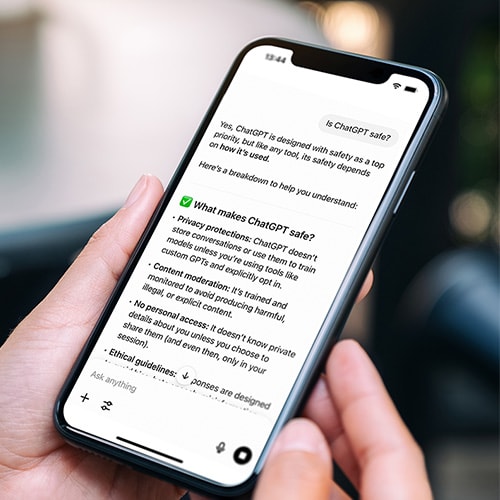Your personal information is out there, floating across the internet in a way that’s often out of your control. Ever wondered why your inbox keeps getting spammed with emails you didn’t sign up for? Or how your phone number ended up in the hands of marketers you’ve never heard of? You can thank data brokers for that.
Worse, this circulation of personal data can increase your risk of identity theft, stalking, and financial fraud. The good news? You can take action to reduce your digital footprint, remove your data from these sites, and protect your privacy.
Good to know: National Public Data, the data broker website that suffered a giant data breach compromising an estimated 2.9 billion records in 2024, is back under new ownership. Click here to learn how to opt out of their database and help protect your privacy.
What are data brokers and why are they a problem?
Data brokers are businesses that collect, compile, and sell your personal data. We're talking about details like your name, phone number, home address, age, income level, and even your social media activity. They gather this information from public databases, social media platforms, and online activity trackers (like cookies). Companies, marketers, and even individuals pay data brokers for access to this information.
What’s the risk of having your data floating around in these databases?
- Identity theft: Fraudsters can buy your information from data brokers and combine it with information they have about you to attempt to steal your identity, open new accounts in your name, or access your existing ones.
- Stalking and harassment: Sensitive information sold online can expose your home address or phone number to people you'd rather not share it with.
- Financial scams: Criminals can use your data to target you with phishing schemes and other malicious social engineering tactics.
Oversharing personal information online can be all too easy with all the activities people do – everything from social media to online shopping to sending emails.
If this sounds alarming, it’s because it is. But don’t worry—you’re not powerless. Roll up your sleeves and follow these three strategies to clean up your online presence.
Opt out of data broker sites
Many data broker sites allow you to request the removal of your information, but the process can be time-consuming. Here's a step-by-step guide to help you get started:
- Locate opt-out pages for each site: Most data brokers have dedicated opt-out pages. Search for “[Broker Name] opt-out” or visit their privacy section. Some common ones include sites like Spokeo, Whitepages, and Radaris.
- Submit removal requests: Follow the instructions on each site to submit your opt-out request. You may have to provide proof of identity (like uploading an ID document) to verify the removal.
- Verify and monitor: Once you've submitted your requests, double-check periodically to ensure your information is truly gone. Use people-search engines to see if your data has been successfully removed.
Automatically monitor your data broker exposure
Manually finding every public data broker site you appear on requires patience and diligence. Using a privacy monitoring tool helps make the process easier, automatically scanning popular data broker sites and sending alerts whenever your personal info is found so you can opt out and reduce your exposure.
These are some of the key benefits of automating privacy monitoring:
- Time savings: Instead of having to manually find all of the data broker sites your personal information appears on, you can sit back and rely on automatic scanning to do the job for you.
- Recurring monitoring: Data brokers frequently update their databases, even re-adding information about users who have previously opted out. Automated services scan these websites regularly to catch reappearances of your data.
- Ease of use: Most services streamline the process with user-friendly dashboards, giving you a bird’s-eye view of your exposure and your opt-out progress.
LifeLock offers a privacy monitoring feature that gives you more control over your online exposure, continuously scanning popular data broker sites and alerting you when your data appears so you can opt out. As a member, you’ll also get dark web monitoring and Social Security alerts, helping you catch even more privacy risks that could leave you vulnerable to fraud or identity theft.
Cut down your digital footprint
Removing your data from broker sites is only part of the solution. Minimizing how much personal information you share online can help prevent brokers from obtaining your data again. Here are some tips to reduce your digital footprint:
- Delete unused apps: Many apps collect and store your data, even if you no longer use them. Uninstall outdated or unnecessary apps and request data deletion where possible.
- Check social media privacy settings: Tighten your privacy settings on platforms like Facebook, Instagram, and LinkedIn. Limit what’s visible to the public, such as hiding your phone number, email, and location.
- Make your social accounts private: A private account restricts who can see your posts and details. This step also reduces the likelihood of your data being scraped by third parties.
- Enable do-not-track features: Adjust browser settings to block cookies or enable “Do Not Track” features, preventing websites from collecting your browsing data.
- Request data removal directly: If you stumble across websites or databases with your information, don’t hesitate to contact the webmaster or use tools like Google’s removal request form.
Taking steps to remove your personal information from the internet can help safeguard your identity.
Don’t expose yourself to fraud
Failing to clean up your personal data can leave you vulnerable to dangerous consequences, including identity theft, scams, and a loss of privacy. But by implementing these strategies — scanning for exposure on data broker sites, manually opting out, and limiting the information you share — you can take meaningful steps toward securing your digital presence.
Looking for expert help? Want to stay a step ahead? Join LifeLock Standard to get comprehensive and automatic privacy monitoring that can help you reduce your online footprint, along with alerts of potential fraud and expert restoration services if you ever fall victim to identity theft.
FAQs
To opt out and remove your information from the National Public Data database, visit the National Public Data website, search your name to find your personal profile, copy the URL from your address bar, paste it into the submission box on the National Public Data opt out page, and click “Request Removal.”
Is data broker removal worth it?
Yes! It’s a practical way to protect your personal information and reduce your exposure to financial fraud or identity theft risks.
How do I remove my email from a data broker list?
Track down the data broker website and use their opt-out page to request removal of your email address from their databases.
How do I opt out of data collection?
Enable privacy settings, limit the information you share online, and submit opt-out requests to data collection services or use an automated removal platform.
Where do data brokers get your information?
Data brokers collect your information from public records, online activities, social media profiles, and third-party cookies.
Editor’s note: Our articles provide educational information. LifeLock offerings may not cover or protect against every type of crime, fraud, or threat we write about.
Start your protection,
enroll in minutes.
Copyright © 2025 Gen Digital Inc. All rights reserved. All trademarks, service marks, and tradenames (collectively, the "Marks") are trademarks or registered trademarks of Gen Digital Inc. or its affiliates ("Gen") or other respective owners that have granted Gen the right to use such Marks. For a list of Gen Marks please see GenDigital.com/trademarks.




